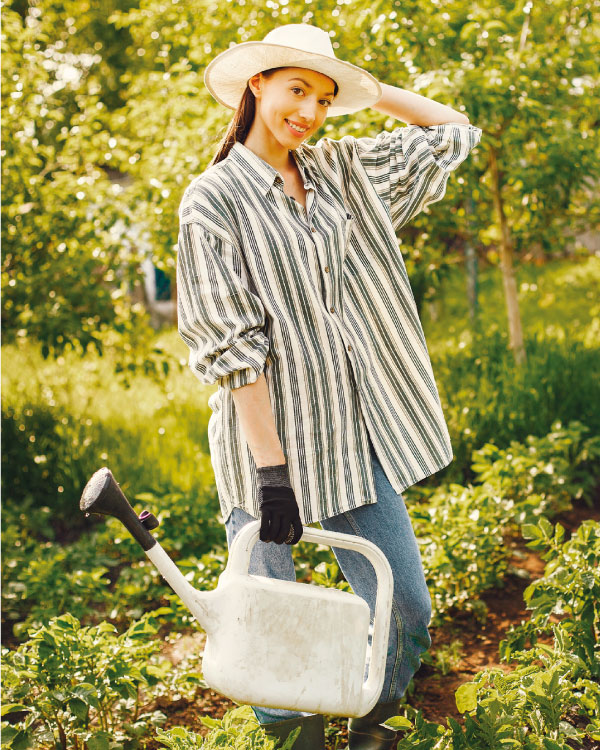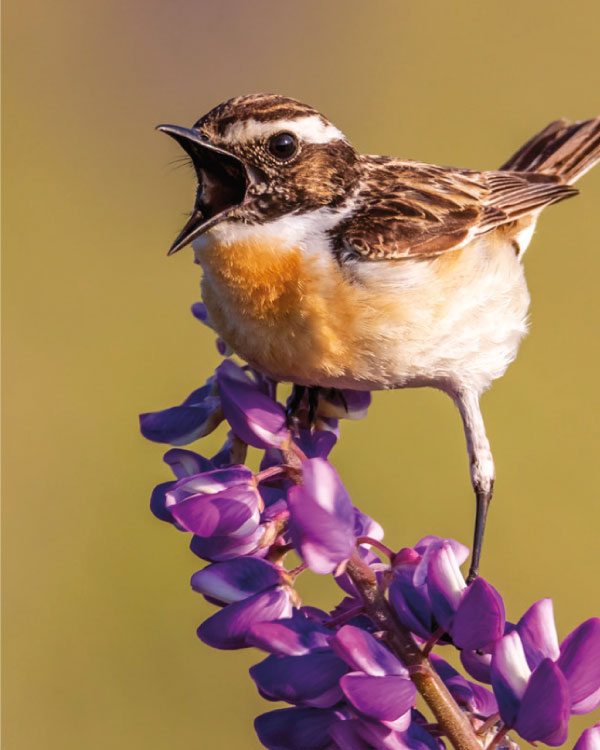BAHAR ALERJİLERİ
According to experts, the main cause of spring allergy is that the immune system perceives pollen as a “harmful substance”.
Meadow, grain, trees and weeds are the most important pollen sources. Tree pollen is spread in February and April, meadow pollen in May and July, and weed pollen mostly in August and October. Pollen levels are high in the morning. Pollen decreases in humid weather, increases in dry and sunny weather.
For this reason, people with allergies should try to stay away from the area and hours where the plant they are sensitive to is dense.
Allergic People
These allergies, especially in children and adults over the age of 3, negatively affect the life quality.


These allergies, especially in children and adults over the age of 3, negatively affect the life quality.
March, April, May and June are difficult months for people with allergic bodies. Runny nose, itching, sneezing in a row, watering in the eyes, redness, itching in the ears and throat, post nasal drip make a person miserable.
Besides these;
Pressure in the sinuses, pain in the face
Swelling under eyes
Decreased sense of smell and taste
Tiredness
Detection difficulties
Sleep disorder, difficulty sleeping, sleep division
Blisters on the body, rashes
Cough and headache are also among the problems experienced by those with allergies.
These allergies have different names:
An allergy caused by pollen in the eye is called “allergic conjunctivitis”.
Capillaries in the eyes and nasal membrane expand, inflating tissues. It causes redness, discharge and itching.
It is popularly called ”hay fever”.
Spring allergy, which occurs on the skin, is called “urticaria” “eczema” and “contact dermatitis”. Itchy, uncomfortable rashes can occur.

If the allergy progresses and affects the lungs, it is called “allergic asthma”. It’s pretty uncomfortable.
Cold or allergy?
Spring allergy is often confused with cold. Although colds occur in cold weather, spring allergies occur in spring and autumn.
Colds go away in 3-5 days, Spring allergies continue for weeks.
In allergies, chills, fever, and fatigue due to febrile illness are not seen in the body as in the common cold.
To Protect Against Pollen Allergy
Experts give various advice on this issue
Do not go out in the open air between 05.00 and 10.00 in the morning, when pollen flies the most.
If you have to get out, cover your mouth and nose with a mask.
Do not exercise outdoors during pollen time.
Try to shower every evening during these periods, as the hair will retain dust.
Do not open the windows too much while driving in the car.
Do not keep doors and windows open for a long time in homes when there is pollen.
Choose the seaside or high mountains for your holiday.
Use glasses and hats outside.
Do not remove clothes worn outside in the bedroom…
Allergies Should Be Taken Care Of
If you have an allergy and have not taken precautions, it can progress over time. It can cause fatigue, loss of appetite, irritability, headache. It can develop into diseases such as sinusitis, otitis media, bronchitis, or asthma. All these ailments also negatively affect the quality of life.
For this reason, allergies should not be avoided, you should definitely consult a doctor and perform the necessary tests and start treatment.
Wishing you a beautiful spring season where you will breathe healthy…
Dilek Tuna Memişoğlu
Bahar showed us its “sweet” face. The Earth came alive, our environment cheered up.
The buds on the branches, the flowers, the spring wind blowing, the sun warming us, give us hope and joy.
With spring, we are all filled with life energy. We are also renewed by the awakening of nature.
Pollen and Allergy
This awakening and revival can cause “allergies” in some of us.
In spring, the pollen of trees and flowers flies around a lot, which affects some “sensitive” people.
According to experts, the main cause of spring allergy is that the immune system perceives pollen as a “harmful substance”.
Meadow, grain, trees and weeds are the most important pollen sources. Tree pollen is spread in February and April, meadow pollen in May and July, and weed pollen mostly in August and October. Pollen levels are high in the morning. Pollen decreases in humid weather, increases in dry and sunny weather.
For this reason, people with allergies should try to stay away from the area and hours where the plant they are sensitive to is dense.
Allergic People
These allergies, especially in children and adults over the age of 3, negatively affect the life quality.


These allergies, especially in children and adults over the age of 3, negatively affect the life quality.
March, April, May and June are difficult months for people with allergic bodies. Runny nose, itching, sneezing in a row, watering in the eyes, redness, itching in the ears and throat, post nasal drip make a person miserable.
Besides these;
Pressure in the sinuses, pain in the face
Swelling under eyes
Decreased sense of smell and taste
Tiredness
Detection difficulties
Sleep disorder, difficulty sleeping, sleep division
Blisters on the body, rashes
Cough and headache are also among the problems experienced by those with allergies.
These allergies have different names:
An allergy caused by pollen in the eye is called “allergic conjunctivitis”.
Capillaries in the eyes and nasal membrane expand, inflating tissues. It causes redness, discharge and itching.
It is popularly called ”hay fever”.
Spring allergy, which occurs on the skin, is called “urticaria” “eczema” and “contact dermatitis”. Itchy, uncomfortable rashes can occur.

If the allergy progresses and affects the lungs, it is called “allergic asthma”. It’s pretty uncomfortable.
Cold or allergy?
Spring allergy is often confused with cold. Although colds occur in cold weather, spring allergies occur in spring and autumn.
Colds go away in 3-5 days, Spring allergies continue for weeks.
In allergies, chills, fever, and fatigue due to febrile illness are not seen in the body as in the common cold.
To Protect Against Pollen Allergy
Experts give various advice on this issue
Do not go out in the open air between 05.00 and 10.00 in the morning, when pollen flies the most.
If you have to get out, cover your mouth and nose with a mask.
Do not exercise outdoors during pollen time.
Try to shower every evening during these periods, as the hair will retain dust.
Do not open the windows too much while driving in the car.
Do not keep doors and windows open for a long time in homes when there is pollen.
Choose the seaside or high mountains for your holiday.
Use glasses and hats outside.
Do not remove clothes worn outside in the bedroom…
Allergies Should Be Taken Care Of
If you have an allergy and have not taken precautions, it can progress over time. It can cause fatigue, loss of appetite, irritability, headache. It can develop into diseases such as sinusitis, otitis media, bronchitis, or asthma. All these ailments also negatively affect the quality of life.
For this reason, allergies should not be avoided, you should definitely consult a doctor and perform the necessary tests and start treatment.
Wishing you a beautiful spring season where you will breathe healthy…
Dilek Tuna Memişoğlu
Uzmanlara göre bahar alerjisinin en temel nedeni; bağışıklık sisteminin, polenleri “zararlı madde” gibi algılamasıdır.
Çayır, tahıl, ağaç ve yabani otlar en önemli polen kaynaklarıdır. Ağaç polenleri şubat-nisan, çayır polenleri mayıs-temmuz, yabani ot polenleri ise en çok ağustos-ekim aylarında yayılırlar.
Polen düzeyi sabah saatlerinde yüksek olur. Nemli havalarda azalır, kuru ve güneşli havalarda artar.
Bu nedenle alerjisi olan kişiler, duyarlı oldukları bitkinin yoğun olduğu bölgeden ve saatlerden uzak durmaya çalışmalıdır.


Özellikle 3 yaş üzeri çocuklarda ve erişkinlerde görülen bu alerjiler yaşam kalitesini olumsuz etkiler.
Alerjik Bünyeli İnsanlar
Özellikle 3 yaş üzeri çocuklarda ve erişkinlerde görülen bu alerjiler yaşam kalitesini olumsuz etkiler.
Mart, nisan, mayıs, haziran ayları alerjik bünyeli insanlar için zorlu geçer. Burun akıntısı, kaşıntısı, peş peşe hapşırıklar, gözlerde sulanma, kızarıklık, kulaklarda ve boğazda kaşıntı, geniz akıntısı insanı perişan eder.
Bunların yanı sıra;
Sinüslerde baskı, yüzde ağrı
Gözaltlarının şişmesi
Koku ve tat alma duyularında azalma
Yorgunluk
Algılama güçlüğü
Uyku bozukluğu, uyumakta zorlanma, uyku bölünmesi
Vücutta kabarıklık, döküntüler
Öksürük ve baş ağrısı da alerjisi olanların yaşadığı sıkıntılardandır.

Bu alerjilerin değişik isimleri vardır:
Polenler nedeniyle gözde oluşan alerjiye, “alerjik konjoktivit” denir.
Gözlerde ve burun zarındaki kılcal damarlar genişleyerek dokuları şişirir. Kızarıklık, akıntı ve kaşıntı yapar.
Halk arasında buna ”saman nezlesi” denir.
Ciltte meydana gelen bahar alerjisine “ürtiker” “egzama” ve “kontakt dermatit” denir. Kaşıntılı, rahatsız edici kızarıklıklar oluşabilir.
Alerji ilerleyip akciğeri etkilerse “alerjik astım” adını alır. Oldukça rahatsızlık vericidir.
Soğuk Algınlığı mı Alerji mi?
Bahar alerjisi ile soğuk algınlığı çoğunlukla karıştırılır. Soğuk algınlığı soğuk havalarda görülse de bahar alerjileri baharda ve sonbaharda olur.
Soğuk algınlığı 3-5 günde geçer, bahar alerjileri haftalarca devam eder.
Alerjilerde, soğuk algınlığındaki gibi vücutta üşütme, ateş, ateşli hastalığa bağlı halsizlik görülmez.
Polen Alerjisinden Korunmak İçin
Uzmanlar bu konuda çeşitli tavsiyeler veriyorlar:
Polenlerin en fazla uçuştuğu sabah 05.00 ile 10.00 saatleri arası açık havaya çıkmayın.
Çıkmak zorundaysanız ağzınızı ve burnunuzu maskeyle kapatın.
Polen zamanı açık havada spor yapmayın.
Saçlar toz tutacağından, bu dönemlerde her akşam duş almaya çalışın.
Arabada giderken camları fazla açmayın.
Polen zamanı evlerde kapı ve pencereleri uzun süre açık tutmayın.
Tatil için deniz kenarı veya yüksek dağları tercih edin.
Dışarıda gözlük ve şapka kullanın.
Dışarıda giyilen kıyafetleri yatak odasında çıkarmayın…
Alerjiler Önemsenmelidir
Eğer bir alerjiniz varsa ve önlem almadıysanız, zamanla ilerleyebilir. Yorgunluk, iştahsızlık, sinirlilik, baş ağrısı yapabilir. Sinüzit, orta kulak iltihabı, bronşit veya astım gibi hastalıklara dönüşebilir. Tüm bu rahatsızlıklar da yaşam kalitesini olumsuz etkiler.
Bu nedenle alerji deyip geçmemeli, mutlaka bir hekime başvurmalı ve gerekli testleri yaptırıp, tedaviye başlanmalıdır.
Sağlıklı nefes alacağınız güzel bir bahar mevsimi dileğiyle…
Dilek Tuna Memişoğlu
Bahar showed us its “sweet” face. The Earth came alive, our environment cheered up.
The buds on the branches, the flowers, the spring wind blowing, the sun warming us, give us hope and joy.
With spring, we are all filled with life energy. We are also renewed by the awakening of nature.
Pollen and Allergy
This awakening and revival can cause “allergies” in some of us.
In spring, the pollen of trees and flowers flies around a lot, which affects some “sensitive” people.
According to experts, the main cause of spring allergy is that the immune system perceives pollen as a “harmful substance”.
Meadow, grain, trees and weeds are the most important pollen sources. Tree pollen is spread in February and April, meadow pollen in May and July, and weed pollen mostly in August and October. Pollen levels are high in the morning. Pollen decreases in humid weather, increases in dry and sunny weather.
For this reason, people with allergies should try to stay away from the area and hours where the plant they are sensitive to is dense.
Allergic People
These allergies, especially in children and adults over the age of 3, negatively affect the life quality.


These allergies, especially in children and adults over the age of 3, negatively affect the life quality.
March, April, May and June are difficult months for people with allergic bodies. Runny nose, itching, sneezing in a row, watering in the eyes, redness, itching in the ears and throat, post nasal drip make a person miserable.
Besides these;
Pressure in the sinuses, pain in the face
Swelling under eyes
Decreased sense of smell and taste
Tiredness
Detection difficulties
Sleep disorder, difficulty sleeping, sleep division
Blisters on the body, rashes
Cough and headache are also among the problems experienced by those with allergies.
These allergies have different names:
An allergy caused by pollen in the eye is called “allergic conjunctivitis”.
Capillaries in the eyes and nasal membrane expand, inflating tissues. It causes redness, discharge and itching.
It is popularly called ”hay fever”.
Spring allergy, which occurs on the skin, is called “urticaria” “eczema” and “contact dermatitis”. Itchy, uncomfortable rashes can occur.

If the allergy progresses and affects the lungs, it is called “allergic asthma”. It’s pretty uncomfortable.
Cold or allergy?
Spring allergy is often confused with cold. Although colds occur in cold weather, spring allergies occur in spring and autumn.
Colds go away in 3-5 days, Spring allergies continue for weeks.
In allergies, chills, fever, and fatigue due to febrile illness are not seen in the body as in the common cold.
To Protect Against Pollen Allergy
Experts give various advice on this issue
Do not go out in the open air between 05.00 and 10.00 in the morning, when pollen flies the most.
If you have to get out, cover your mouth and nose with a mask.
Do not exercise outdoors during pollen time.
Try to shower every evening during these periods, as the hair will retain dust.
Do not open the windows too much while driving in the car.
Do not keep doors and windows open for a long time in homes when there is pollen.
Choose the seaside or high mountains for your holiday.
Use glasses and hats outside.
Do not remove clothes worn outside in the bedroom…
Allergies Should Be Taken Care Of
If you have an allergy and have not taken precautions, it can progress over time. It can cause fatigue, loss of appetite, irritability, headache. It can develop into diseases such as sinusitis, otitis media, bronchitis, or asthma. All these ailments also negatively affect the quality of life.
For this reason, allergies should not be avoided, you should definitely consult a doctor and perform the necessary tests and start treatment.
Wishing you a beautiful spring season where you will breathe healthy…
Dilek Tuna Memişoğlu
Bahar bizlere “tatlı” yüzünü gösterdi. Toprak canlandı, etraf şenlendi.
Dallarda tomurcuklar, çiçekler, esen bahar rüzgârı, bizi ısıtan güneş, içimize umut ve sevinç veriyor.
Baharla birlikte hepimize bir yaşam enerjisi geliyor. Doğanın uyanışıyla biz de yenileniyoruz.
Polenler ve Alerji
Bu uyanış ve canlanma bazılarımızda “alerji” lere sebep olabiliyor.
Bahar aylarında ağaçların, çiçeklerin polenleri etrafta fazlaca uçuşur; bu da bazı “hassas bünyeli” insanlara dokunur.
Uzmanlara göre bahar alerjisinin en temel nedeni; bağışıklık sisteminin, polenleri “zararlı madde” gibi algılamasıdır.
Çayır, tahıl, ağaç ve yabani otlar en önemli polen kaynaklarıdır. Ağaç polenleri şubat-nisan, çayır polenleri mayıs-temmuz, yabani ot polenleri ise en çok ağustos-ekim aylarında yayılırlar.
Polen düzeyi sabah saatlerinde yüksek olur. Nemli havalarda azalır, kuru ve güneşli havalarda artar.
Bu nedenle alerjisi olan kişiler, duyarlı oldukları bitkinin yoğun olduğu bölgeden ve saatlerden uzak durmaya çalışmalıdır.


Özellikle 3 yaş üzeri çocuklarda ve erişkinlerde görülen bu alerjiler yaşam kalitesini olumsuz etkiler.
Alerjik Bünyeli İnsanlar
Özellikle 3 yaş üzeri çocuklarda ve erişkinlerde görülen bu alerjiler yaşam kalitesini olumsuz etkiler.
Mart, nisan, mayıs, haziran ayları alerjik bünyeli insanlar için zorlu geçer. Burun akıntısı, kaşıntısı, peş peşe hapşırıklar, gözlerde sulanma, kızarıklık, kulaklarda ve boğazda kaşıntı, geniz akıntısı insanı perişan eder.
Bunların yanı sıra;
Sinüslerde baskı, yüzde ağrı
Gözaltlarının şişmesi
Koku ve tat alma duyularında azalma
Yorgunluk
Algılama güçlüğü
Uyku bozukluğu, uyumakta zorlanma, uyku bölünmesi
Vücutta kabarıklık, döküntüler
Öksürük ve baş ağrısı da alerjisi olanların yaşadığı sıkıntılardandır.

Bu alerjilerin değişik isimleri vardır:
Polenler nedeniyle gözde oluşan alerjiye, “alerjik konjoktivit” denir.
Gözlerde ve burun zarındaki kılcal damarlar genişleyerek dokuları şişirir. Kızarıklık, akıntı ve kaşıntı yapar.
Halk arasında buna ”saman nezlesi” denir.
Ciltte meydana gelen bahar alerjisine “ürtiker” “egzama” ve “kontakt dermatit” denir. Kaşıntılı, rahatsız edici kızarıklıklar oluşabilir.
Alerji ilerleyip akciğeri etkilerse “alerjik astım” adını alır. Oldukça rahatsızlık vericidir.
Soğuk Algınlığı mı Alerji mi?
Bahar alerjisi ile soğuk algınlığı çoğunlukla karıştırılır. Soğuk algınlığı soğuk havalarda görülse de bahar alerjileri baharda ve sonbaharda olur.
Soğuk algınlığı 3-5 günde geçer, bahar alerjileri haftalarca devam eder.
Alerjilerde, soğuk algınlığındaki gibi vücutta üşütme, ateş, ateşli hastalığa bağlı halsizlik görülmez.
Polen Alerjisinden Korunmak İçin
Uzmanlar bu konuda çeşitli tavsiyeler veriyorlar:
Polenlerin en fazla uçuştuğu sabah 05.00 ile 10.00 saatleri arası açık havaya çıkmayın.
Çıkmak zorundaysanız ağzınızı ve burnunuzu maskeyle kapatın.
Polen zamanı açık havada spor yapmayın.
Saçlar toz tutacağından, bu dönemlerde her akşam duş almaya çalışın.
Arabada giderken camları fazla açmayın.
Polen zamanı evlerde kapı ve pencereleri uzun süre açık tutmayın.
Tatil için deniz kenarı veya yüksek dağları tercih edin.
Dışarıda gözlük ve şapka kullanın.
Dışarıda giyilen kıyafetleri yatak odasında çıkarmayın…
Alerjiler Önemsenmelidir
Eğer bir alerjiniz varsa ve önlem almadıysanız, zamanla ilerleyebilir. Yorgunluk, iştahsızlık, sinirlilik, baş ağrısı yapabilir. Sinüzit, orta kulak iltihabı, bronşit veya astım gibi hastalıklara dönüşebilir. Tüm bu rahatsızlıklar da yaşam kalitesini olumsuz etkiler.
Bu nedenle alerji deyip geçmemeli, mutlaka bir hekime başvurmalı ve gerekli testleri yaptırıp, tedaviye başlanmalıdır.
Sağlıklı nefes alacağınız güzel bir bahar mevsimi dileğiyle…
Dilek Tuna Memişoğlu
Bahar showed us its “sweet” face. The Earth came alive, our environment cheered up.
The buds on the branches, the flowers, the spring wind blowing, the sun warming us, give us hope and joy.
With spring, we are all filled with life energy. We are also renewed by the awakening of nature.
Pollen and Allergy
This awakening and revival can cause “allergies” in some of us.
In spring, the pollen of trees and flowers flies around a lot, which affects some “sensitive” people.
According to experts, the main cause of spring allergy is that the immune system perceives pollen as a “harmful substance”.
Meadow, grain, trees and weeds are the most important pollen sources. Tree pollen is spread in February and April, meadow pollen in May and July, and weed pollen mostly in August and October. Pollen levels are high in the morning. Pollen decreases in humid weather, increases in dry and sunny weather.
For this reason, people with allergies should try to stay away from the area and hours where the plant they are sensitive to is dense.
Allergic People
These allergies, especially in children and adults over the age of 3, negatively affect the life quality.


These allergies, especially in children and adults over the age of 3, negatively affect the life quality.
March, April, May and June are difficult months for people with allergic bodies. Runny nose, itching, sneezing in a row, watering in the eyes, redness, itching in the ears and throat, post nasal drip make a person miserable.
Besides these;
Pressure in the sinuses, pain in the face
Swelling under eyes
Decreased sense of smell and taste
Tiredness
Detection difficulties
Sleep disorder, difficulty sleeping, sleep division
Blisters on the body, rashes
Cough and headache are also among the problems experienced by those with allergies.
These allergies have different names:
An allergy caused by pollen in the eye is called “allergic conjunctivitis”.
Capillaries in the eyes and nasal membrane expand, inflating tissues. It causes redness, discharge and itching.
It is popularly called ”hay fever”.
Spring allergy, which occurs on the skin, is called “urticaria” “eczema” and “contact dermatitis”. Itchy, uncomfortable rashes can occur.

If the allergy progresses and affects the lungs, it is called “allergic asthma”. It’s pretty uncomfortable.
Cold or allergy?
Spring allergy is often confused with cold. Although colds occur in cold weather, spring allergies occur in spring and autumn.
Colds go away in 3-5 days, Spring allergies continue for weeks.
In allergies, chills, fever, and fatigue due to febrile illness are not seen in the body as in the common cold.
To Protect Against Pollen Allergy
Experts give various advice on this issue
Do not go out in the open air between 05.00 and 10.00 in the morning, when pollen flies the most.
If you have to get out, cover your mouth and nose with a mask.
Do not exercise outdoors during pollen time.
Try to shower every evening during these periods, as the hair will retain dust.
Do not open the windows too much while driving in the car.
Do not keep doors and windows open for a long time in homes when there is pollen.
Choose the seaside or high mountains for your holiday.
Use glasses and hats outside.
Do not remove clothes worn outside in the bedroom…
Allergies Should Be Taken Care Of
If you have an allergy and have not taken precautions, it can progress over time. It can cause fatigue, loss of appetite, irritability, headache. It can develop into diseases such as sinusitis, otitis media, bronchitis, or asthma. All these ailments also negatively affect the quality of life.
For this reason, allergies should not be avoided, you should definitely consult a doctor and perform the necessary tests and start treatment.
Wishing you a beautiful spring season where you will breathe healthy…
Dilek Tuna Memişoğlu





